GRBusiness
Growth in South African Retail Sales Slows in June 2018 but Remains Positive


- Clothing is the best-performing retail sector in June, says Mastercard SpendingPulse™ Report
South African retail sales for June 2018 grew by 2.9 percent year-on-year excluding the effects of inflation, marking the weakest pace of growth since October 2017.
This is according to the Mastercard SpendingPulse June 2018 report, which provides a macro-economic analysis of retail spending trends in South Africa.
June’s retail sales volume was slightly below the three percent year-on-year gain recorded in May 2018 and signals the third consecutive month that the rate of growth has decelerated in South Africa’s retail sector.
Total retail sales growth, including the effects of inflation, grew 5.8 percent year-on-year.
“While real spending in the retail sector remains in positive territory, we did see the rate of growth continue to slow in June. Retail price inflation also ticked up for the first time in a year, after bottoming out in May. This may further weigh on consumers in the coming months as they already face tight wallets due to weak wage growth and rising unemployment,” says Michael McNamara, Senior Principal, Data and Services at Mastercard.
“Slowing GDP growth in the first quarter, rising fuel prices and a strengthening US dollar also contribute to a challenging macro-economic environment,” McNamara says.
Clothing was the best-performing segment of the retail market in June, with sales excluding the effects of inflation rising 4.4 percent year-on-year. Overall, June sales were 8.4 percent above average for this time of year. Sales including the effects inflation were also up, growing 6.3 percent year-on-year.
The Pharmaceutical, Medical Goods, Cosmetics and Toiletry category once again performed well with sales excluding the effects of inflation growing 4.2 percent year-on-on-year for June 2018. Including the effects of inflation, sales grew 7.2 percent, meaning that inflation contributed only three percentage points to growth, compared to 3.6 percentage points in May.
In the Food and Beverages sector, sales excluding the effects of inflation grew 3.8 percent year-on-year in June, showing an improvement over the 1.5 percent growth rate of the first quarter in 2018. Sales including the effects of inflation grew 8.9 percent.
Confirming a trend evident in most months of 2018, the General Dealer sector once again underperformed the rest of the retail market. General Dealer sales volumes excluding the effects of inflation fell 2.9 percent year-on-year for June 2018. Including the effects of inflation, General Dealer sales rose 3.6 percent year-on-year.
“As the benefit from lower food and oil prices runs its course, growth in consumer spending is expected to face an additional headwind from a higher value-added tax, which increased from 14 percent to 15 percent in April,” says McNamara.
Mastercard SpendingPulse South Africa reports on national retail sales and uses aggregated and anonymous Mastercard transaction data, coupled with survey-based estimates for other payment forms including cash and cheque. Reports are released monthly to subscribers ahead of other sources, providing timely, accurate, and unbiased insight into the South African economy.
The report also includes an overall retail sales and price index to illustrate whether spending growth is being driven by increased shopping, inflation or increased promotions.
Finance
Banks To Now Charge 0.5% Cybersecurity Levy As Directed By CBN; Netizens React
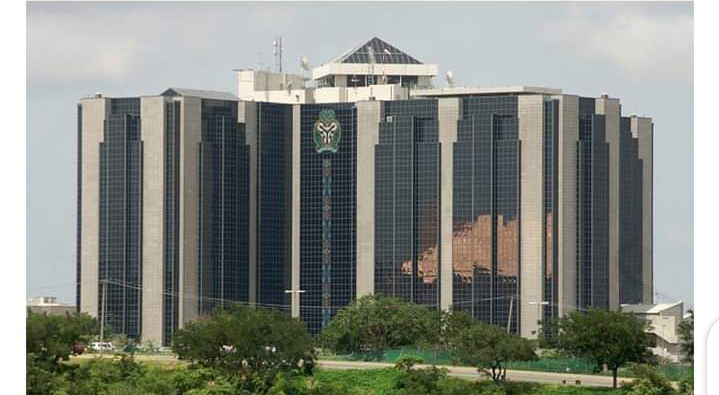

The Central Bank of Nigeria (CBN) has directed deposit money banks in the country to start charging 0.5% cybersecurity levy on some transactions done by their customers.
The apex bank gave the directive in a circular dated May 6, 2024 and sent to all commercial, merchant, non-interest and payment service banks as well as mobile money operators and payment service providers.
“Following the enactment of the Cybercrime (Prohibition, Prevention, etc) (amendment) Act 2024 and pursuant to the provision of Section 44 (2) (a) of the Act, ‘a levy of 0.5% (0.005) equivalent to a half percent of all electronic transactions value by the business specified in the Second Schedule of the Act’, is to be remitted to the National Cybersecurity Fund (NCF), which shall be administered by the Office of the National Security Adviser (ONSA),” the circular partly read.
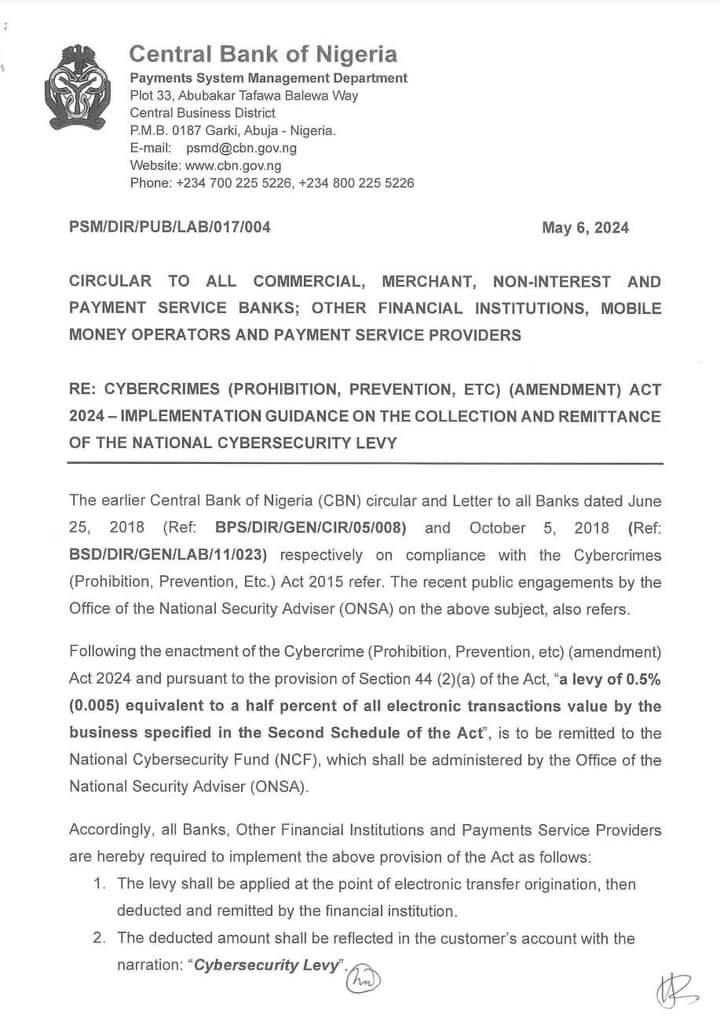

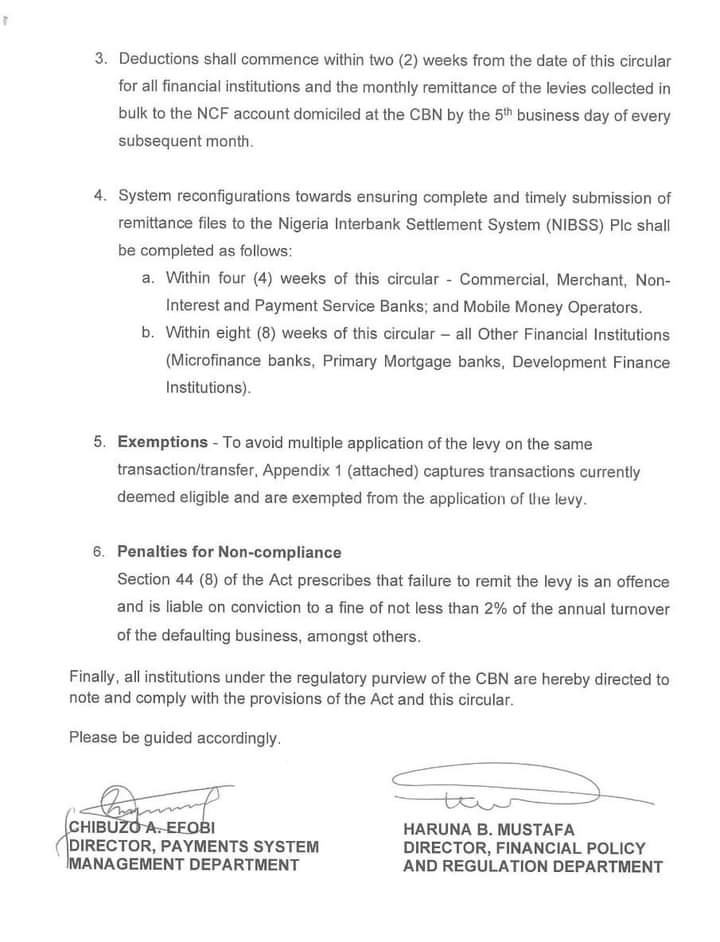

The apex bank said that the implementation of the levy would start two weeks from the date of the circular.
“The levy shall be applied at the point of electronic transfer origination, then deducted and remitted by the financial institution. The deducted amount shall be reflected in the customer’s account with the narration, ‘Cybersecurity Levy’. Deductions shall commence within two weeks from the date of this circular for all financial institutions and the monthly remittance of the levies collected in bulk to the NCF account domiciled at the CBN by the fifth business day of every subsequent month,” the circular said
The apex bank added that this new levy will not be applied on transactions such as loan disbursements and repayments, salary payments, intra-account transfers within the same bank or between different banks for the same customer, intra-bank transfers between customers of the same bank.
Also exempted from the levy were inter-branch transfers within a bank, cheque clearing and settlements, Letters of Credits, Banks’ recapitalisation-related funding only bulk funds movement from collection accounts, savings and deposits including transactions involving long-term investments, among others.
This current implementation however is not sitting well with some netizens as they reacted to the new development.
Here were some of their reactions from X.
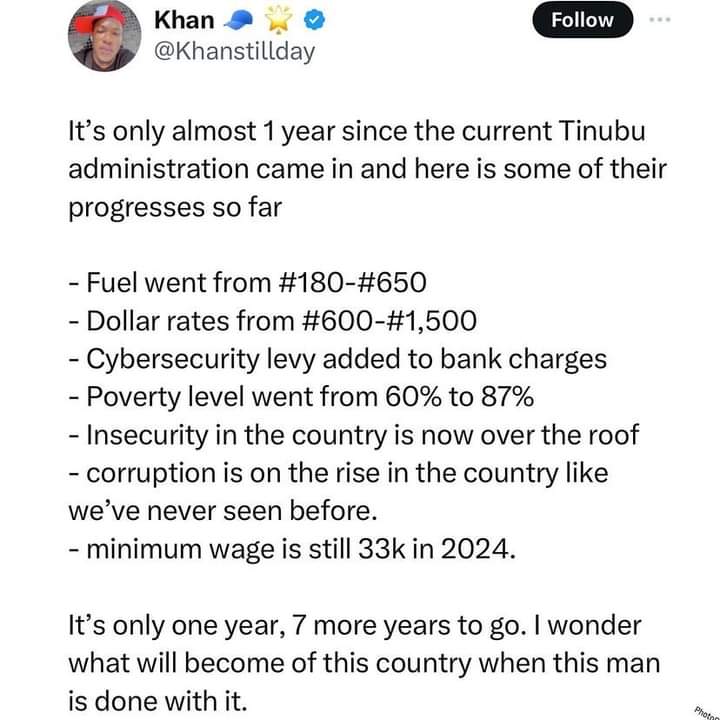





Finance
EFCC Chairman Tasks Nigerian Youths Against Crimes And Fraudulent Acts


The Chairman of Economic Finance Crime Commission (EFCC), Ola Olukoyede, has stressed the need for Nigerian Youth to see themselves as agents of positive change that have a lot to contribute to the socioeconomic development of the Nation.
Speaking at the 2nd edition of a Leadership Trainings Programme in Abuja, Olukoyede, who was represented by the Head Enlightenment and Re-orientation unit, (EFCC), Aisha Mohammed, said the commission’s dream is to see the youth contribute meaningfully to the society, emphasizing on the need to work together in bringing positive change to society.
The Economic and Financial Crimes Commission Boss declared the readiness of his agency to work with all Stakeholders, including the youth towards changing the narrative and reposition the country to greater exploit.
Also speaking, the representative of the Executive Secretary of Tertiary Education Trust Fund (TETFUND), Sonny Echono, appealed to the youths is to eschew social vices that could deter their full potential in life.
Other speakers at the event, including the Chairperson, Zero Tolerance for Social Immoralities Initiative (ZEITI) Africa, Rasak Jeje called on all stakeholders to join hands in collective pursuit of empowering new generation of leaders to curb the rising tides of social Vice among Nigerian youths.
The Chairperson, Zero Tolerance for Social Immoralities Initiative (ZEITI) Africa, Rasak Jeje made the call while addressing journalists at the 2nd edition of it Leadership Trainings Programme in Abuja on Thursday.
He said the training was aimed to intimate students leaders with knowledge and insights that will help them drive positive change and become exemplary leaders in their respective spheres.
Finance
AISA Has Refunded The Fees Paid By Yahaya Bello To EFCC


The Economic and Financial Crimes Commission (EFCC) says the American International School Abuja (AISA) has refunded the fees paid by the immediate past governor of Kogi state, Yahaya Bello, for his children attending the school.
In response to a letter addressed to the Lagos zonal commander of the EFCC, the school said $845,852 was paid in tuition “since the 7th of September 2021 to date”.
AISA said the sum to be refunded is $760,910 because it had deducted educational services already rendered.
“Please forward to us an official written request, with the authentic banking details of the EFCC, for the refund of the above-mentioned funds as previously indicated as part of your investigation into the alleged money laundering activities by the Bello family.
Since the 7th September 2021 to date, $845,852.84 (Eight Hundred and Forty-Five Thousand, Eight Hundred and Fifty Two US Dollars and eighty four cents) in tuition and other fees has been deposited into our Bank account.
We have calculated the net amount to be transferred and refunded to the State, after deducting the educational services rendered as $760,910.84. (Seven Hundred and Sixty Thousand, Nine Hundred and Ten US Dollars and Eighty Four cents).
No further additional fees are expected in respect of tuition as the students’ fees have now been settled until they graduate from ASIA.”
In a chat with The Cable, the spokesperson of the EFCC, Dele Oyewale, confirmed that the school has refunded the money.
‘’The money has been paid into public account,” Dele Oyewale was quoted as saying
-



 Politics2 days ago
Politics2 days agoLagos Water Corporation Starts Protest Against Sack Of Workers
-



 News4 days ago
News4 days ago“80% Of Buildings In Lekki Have No Approval” – Lagos State Commissioner For Physical Planning & Urban Development Reveals
-



 Entertainment4 days ago
Entertainment4 days agoCelebrities Turn Up For The Dedication Of Ali Baba’s Triplets In Lagos
-

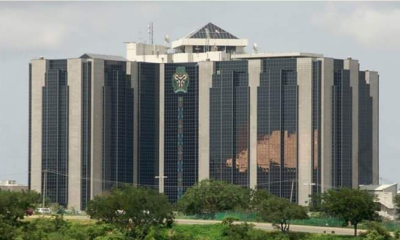

 Finance3 days ago
Finance3 days agoBanks To Now Charge 0.5% Cybersecurity Levy As Directed By CBN; Netizens React
-



 TechNews4 days ago
TechNews4 days agoSIM Boxing, And The Unboxing of a Crime Syndicate
-



 News2 days ago
News2 days agoEkiti Students Caught On Camera Bullying A Fellow Student, Have Been Expelled
-



 GRTech3 days ago
GRTech3 days agoSHELT SI Achieves Cisco Select Partner Certification
-



 Spotlight20 hours ago
Spotlight20 hours agoYoung Man Named Young C, Delves Into The Challenge Of Being Buried Alive For 24 Hours









